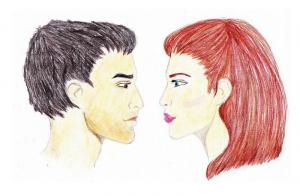What is a relationship with jealousy problems like? 7 symptoms
Jealousy is a type of problem that many relationships suffer in silence. And this is not only because for many people the things in the relationship that make them feel bad are a true taboo; Furthermore, jealousy is not talked about simply because It is assumed that no matter how harmful they may be, they are something normal in love.
Obviously, not knowing how to recognize a problem does not mean that it does not exist. In fact, this "blindness" usually contributes to the situation becoming more and more serious, generating other unwanted consequences due to a domino effect and becoming part of everyday life. That is why when jealousy arises in a relationship, it is important to be aware of it as soon as possible, to determine if their intensity makes them an obstacle to living that love bond in a healthy.
Keep reading to know the main symptoms that indicate the presence of problems due to jealousy in a relationship.
- Related article: "12 tips to better manage couple arguments"
This is the relationship of a couple with jealousy problems: 7 warning signs
If you are in a relationship and there are some behaviors that make you uncomfortable and suspect that they have to do with the desire to control and monitor, these guidelines will help you to know if your courtship or marriage is affected by the problems of jealousy.
These are common symptoms that arise when one or both of the people involved tend to act like jealous lovers. They do not have to happen all at once, but together they help to know what is happening.
1. Ask for the other's phone to review chats and images
Sometimes, this "scan" of the contents of the smartphone is camouflaged under some excuse, such as trying to find a specific photo or being curious about the things that a certain person says on WhatsApp in order to laugh at them.
However, in practice it is easy to verify that jealousy is what motivates this behavior, because on the one hand it does not happen in punctually, but with a certain frequency, and on the other hand, the way of looking for content reflects that the jealous person does not look for content in concrete, but "scans" with his eyes as much as possible in search of something that catches his attention, something that reveals flirtation, sexual interest or infidelity.
2. Pouting when the other person is partying with friends
One of the characteristics of jealousy is that it is triggered at times when there is a lack of information about what the other person is doing, the one who wants to be under control. In cases like this, it is easier to imagine the worst, and attention is drawn to painful images about infidelities or the breakdown of the relationship, the In the same way that someone who is a hypochondriac cannot help but think that she probably has diseases serious.
And when we add to this that he is a person, he is in leisure contexts where flirting is commonLike the discos or concerts, the discomfort of not being by their side is even more indentified in those who have become accustomed to adopting a possessive attitude in relation to the other.
That is why, in jealous people, that the other party without them is seen as a threat.
3. Asking about the attractive potential of classmates or coworkers
In relationships where there are jealousy problems, the jealous person always tries to have potential competitors on the radar who can "take away" who she loves. That is why, in a sneaky way, he asks questions about the traits and characteristics of the people he considers most threatening in this sense: "How is your face? Is high? Maybe it sounds like a sight to me. " "Do you have a partner?" "Do you talk a lot?" ...
Of course, none of these questions alone indicates that there is jealousy, but taken as a whole, they give a picture of what is happening.
- You may be interested: "Low selfsteem? When you become your worst enemy"
4. Ennemy with someone for no apparent reason
Many times, someone who is jealous cannot hide her dislike for someone who is seen as a source of danger., a temptation for that person who risks losing. At times, he even tries to get his partner (for whom he is afraid of being abandoned or abandoned) join in teasing or acts of cruelty directed against that external threat.
5. Set schedules unilaterally
Asking the other member of the couple to be home before it gets too late, or hinting that spending too much time away will cause the jealous person upset, is a way of controlling that reveals an obvious problem of jealousy, one of the most serious, and must be treated in therapy or that, directly, is a reason to end the relationship (depending on the degree of hostility and insistence with which it is tried to implant).
6. Try to isolate socially
This is one of the behaviors associated with the most serious jealousy problems, a harmful behavior that, depending on how it occurs, can be considered abuse. It is carried out by feeding the idea that outside of the couple's relationship there is nothing that really matters, and that This every time you decide to spend time with friends or family is a reason for disappointment and frustration.
What's more, an attempt is made to emphasize the differences between the interior and exterior of the couple, through beliefs such as "everyone is equal", "we need to protect each other so that they do not harm us", "they do nothing but judge us", and so on.
The ultimate goal of this is usually to make it easier to manipulate the other person, making it easier to control.
- You may be interested: "Effect of homogeneity relative to the outgroup: what it is and how it influences us"
7. Threats
Finally, this is a symptom in which jealousy is inextricably fused with abuse. By threats, in this context we understand warnings that if something is done that transgresses the norms of fidelity and exclusivity of the couple, physical assaults or humiliation will occur as punishment that will have an impact on the victim's social environment (for example, circulating intimate photos over the Internet).
In these cases there is no longer so much talk of a problem caused by a jealous person, but of a threat to the integrity of the victim which is reason enough to end the relationship and contact the authorities.
Bibliographic references:
- Bevan, J.L. (2004). General partner and relational uncertainty as consequences of another person's jealousy expression. Western Journal of Communication. 68 (2): 195–218.
- Shackelford, T.K.; Voracek, M.; Schmitt, D.P.; Buss, D.M.; Weekes-Shackelford, V.A.; Michalski, R.L. (2004). Romantic jealousy in early adulthood and in later life. Human Nature. 15 (3): 283 - 300.
- Sternberg, R. (2004). A Triangular Theory of Love. In Reis, H. T.; Rusbult, C. AND. Close Relationships. New York: Psychology Press.


